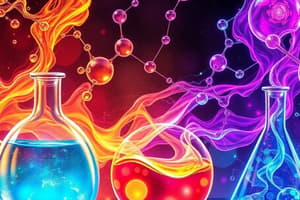Podcast
Questions and Answers
What type of reaction involves the exchange of ions between two compounds to form different compounds?
What type of reaction involves the exchange of ions between two compounds to form different compounds?
- Single displacement reaction
- Double displacement reaction (correct)
- Decomposition reaction
- Synthesis reaction
Which factor influences the rate of a chemical reaction by increasing the kinetic energy of particles?
Which factor influences the rate of a chemical reaction by increasing the kinetic energy of particles?
- Catalysts
- Concentration
- Temperature (correct)
- Surface area
What type of reaction involves the breakdown of a compound into simpler substances?
What type of reaction involves the breakdown of a compound into simpler substances?
- Redox reaction
- Single displacement reaction
- Decomposition reaction (correct)
- Synthesis reaction
Which type of reaction involves the transfer of electrons between substances leading to oxidation and reduction?
Which type of reaction involves the transfer of electrons between substances leading to oxidation and reduction?
What type of reaction involves the formation of a compound from simpler substances?
What type of reaction involves the formation of a compound from simpler substances?
Which factor influences the rate of a chemical reaction by increasing the number of particles in a given volume?
Which factor influences the rate of a chemical reaction by increasing the number of particles in a given volume?
What type of chemical reaction involves the replacement of one element in a compound by another?
What type of chemical reaction involves the replacement of one element in a compound by another?
Which type of chemical reaction occurs when two compounds exchange their constituent ions to form different compounds?
Which type of chemical reaction occurs when two compounds exchange their constituent ions to form different compounds?
What is the outcome of a combination reaction in chemistry?
What is the outcome of a combination reaction in chemistry?
Which type of chemical reaction involves the breakdown of a compound into simpler substances?
Which type of chemical reaction involves the breakdown of a compound into simpler substances?
In a double-replacement reaction, what do the two compounds do?
In a double-replacement reaction, what do the two compounds do?
What characterizes a decomposition reaction in chemistry?
What characterizes a decomposition reaction in chemistry?
Flashcards are hidden until you start studying
Study Notes
Chemical Reactions: The Building Blocks of Chemistry
Chemical reactions are fundamental to our understanding of the natural world, as they govern how matter changes and transforms. These processes involve the breaking of chemical bonds between atoms and the formation of new bonds, ultimately leading to the creation of new substances. In this exploration of chemistry, we'll delve into the fascinating realm of chemical reactions.
Definition and Classification
A chemical reaction is an event where one or more substances interact to form different substances. These reactions can be classified based on the number of products, reactants, and the type of change that occurs.
- Single-replacement reactions: Involve the replacement of one element in a compound by another. For example, zinc displacing hydrogen from hydrochloric acid to produce zinc chloride and hydrogen gas.
- Double-replacement reactions: Two compounds exchange their constituent ions to form different compounds. For instance, calcium carbonate and hydrochloric acid react to form calcium chloride, carbon dioxide, and water.
- Combination reactions: A simpler substance reacts with a compound to form a more complex substance. An example is the reaction between carbon and oxygen to form carbon dioxide.
- Decomposition reactions: A compound breaks down into simpler substances. For example, the decomposition of hydrogen peroxide into water and oxygen.
Types of Reactions
Chemical reactions can also be classified based on the type of change that occurs.
- Synthesis (combination): Formation of a compound from simpler substances.
- Decomposition: Breakdown of a compound into simpler substances.
- Single displacement (substitution): Replacement of one element in a compound by another.
- Double displacement (metathesis): Exchange of ions between two compounds to form different compounds.
- Redox (oxidation-reduction): Transfer of electrons between substances, leading to the oxidation of one substance and the reduction of another.
Reaction Rates and Factors
The rate at which a chemical reaction occurs is governed by various factors that influence the frequency of collisions between reacting particles. These factors include:
- Concentration: Higher concentrations lead to a higher number of particles in a given volume, increasing the frequency of collisions.
- Temperature: Higher temperatures increase the kinetic energy of particles, leading to more frequent and energetic collisions.
- Surface area: Increased surface area results in more particles available for collisions.
- Catalysts: Chemical substances that increase the rate of a reaction without being consumed in the process.
Energy and Reactions
Most chemical reactions involve the absorption or release of energy. The energy change in a reaction is quantified by the reaction's enthalpy. Reactions can be classified as follows based on the energy change:
- Exothermic: Reactions that release energy.
- Endothermic: Reactions that absorb energy.
Summary
Chemical reactions are the foundation of chemistry, shaping our understanding of the natural world. They represent the conversion of matter from one form to another, governed by the principles of matter conservation, energy conservation, and stoichiometry. Through our exploration of chemical reactions, we can uncover the transformative processes that underpin the world we live in.
Studying That Suits You
Use AI to generate personalized quizzes and flashcards to suit your learning preferences.




